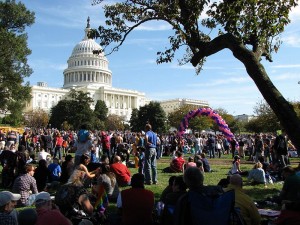 The government giveth and the government taketh away. This week, it is mostly takething away.
The government giveth and the government taketh away. This week, it is mostly takething away.
We’ll try to make this easy, but as always with legislation and regulation, the devil is in the details.
First, the transportation bill that will be signed into law today significantly changes the funding of biking and walking paths. Under earlier transportation bills, money was set aside for those projects (under the notion that cars and trucks don’t own the surface of the planet and walkers and bikers ought to be able to move about without risking death or injury).
The current law cuts the funds available for “Transportation Alternatives” and changes what they can be spent on. According to Streetsblog, a state that doesn’t spend its allocated TA funds in the first fiscal year can then spend the money on “anything else that can be interpreted as improving air quality.”
Bottomline: “States that sit on their TA money long enough can use it for things like truck stop electrification systems, HOV lanes, turning lanes, and diesel retrofits.”
Next, there’s the looming fiscal cliff. Congress has established a poison pill—$1.2 trillion in forced budget cuts coming later this year—if it can’t agree on ways to increase revenues or cut spending. The impact will ripple throughout the economy. Bloomberg estimates that it will eliminate hundreds of thousands of defense jobs as well as about 300,000 non-defense jobs.
Under the cuts, about 300 national parks would be fully or partially closed. This underscores how short-sighted, which is a polite way of saying stupid, these forced cuts can be. Study after study says the national parks generate more wealth than they cost. A lot more than they cost; in fact, the return on investment is estimated to be 4 to 1.
Lastly, if you want to thank Congress for something, you might let them know you approve of new rules that will allow some mountain biking in national parks. Adventure Journal has a nice piece on the change, which allows “park superintendents the right to open their dirt roads to cyclists.” It won’t change overnight, and we hope it doesn’t end in swarms of bikers penetrating deep into areas that are best left to non-mechanized transport, but it could have important benefits. “In parks with vast networks of goat paths and dirt roads, this likely paves the way for deeper access into the backcountry by mountain bike.” And that sounds like progress.
Participants on the west lawn of the US Capitol at the end of the National Equality March (2009) by Ben Schumin









